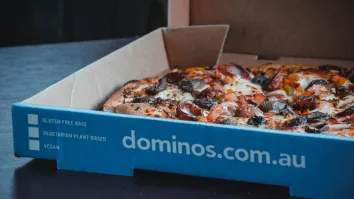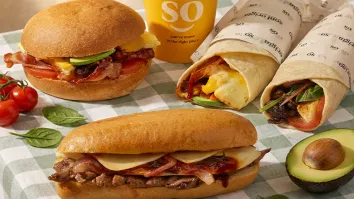
Ingredient swaps, shorter hours: how chains are coping with Omicron-induced disruptions
Recent Google data showed user mobility in VIC, NSW and ACT declining the most in the last six weeks to 10 January.
The restaurant industry was collectively eager to innovate in welcoming customers back to their stores in 2022, but the latest COVID-19 variant, Omicron, dampened what many hoped to be a summer rebound.
Instead, Australia's fast food chains have hastened to reassure customers they remain ready to serve amidst ongoing supply chain disruptions and staffing issues due to forced isolations.
ASX-listed Collins Foods, which operates 240 franchised KFC restaurants in Australia, says some of its outlets are unable to offer their full menu due to "intermittent" supply chain disruptions.
Inghams, a major supplier of the operator’s chicken products, recently suspended deliveries of these poultry products amid critical staff shortages and said disruptions caused by the increasing rate of COVID-19 cases and isolations on the east coast.
“KFC is currently experiencing intermittent supply chain disruptions nationally due to COVID-19 related absenteeism at our chicken suppliers, meaning some of our restaurants are unable to offer our full menu which relies on fresh chicken,” a spokesperson said.
“We’re working with our multiple suppliers to mitigate the impact and provide them with support, but we expect some disruptions to continue in the coming weeks.”
McDonald’s said some of its restaurants have been forced to cut trading hours as increasing numbers of workers are forced to isolate due to COVID-19.
“McDonald’s Australia continues to operate in accordance with Government advice to keep our restaurants open and to ensure our customers can continue to enjoy our great tasting food,” the chain said in a statement.
“Like many businesses, some McDonald’s restaurants have had to temporarily reduce operating hours due to staff isolation requirements. We appreciate our customer’s patience and understanding as we continue to prioritise health and safety during these times.”
Subway, meanwhile, is considering using planes to transport ingredients.
"We're keeping that open as a real option," Scott Buckman, Subway's acting country director for Australia, told The Australian Financial Review. "It's not an ideal solution, it's not something we have jumped to do yet, but it's a thing we are considering."
Google’s latest Community Mobility Report for Australia (dated 10 January), examining behaviour 29 November 2021 to 10 January 2022, saw mobility trends in restaurants, cafés, shopping centres, theme parks, museums, libraries and cinemas declining by 12%.
Examining each state, mobility in VIC declined the most with 22%, followed by NSW with 20% and ACT by 17%. SA, QLD and NT saw single-digit declines in movement with 8%, 5% and 2%, respectively.
WA, which has managed to avoid large Covid-19 outbreaks, saw an 11% rise in mobility during the said period.
‘A never-ending cycle of new challenges’
Speaking to QSR Media, executives of a couple of chains headquartered in Melbourne — considered to have experienced the world’s longest lockdown — shed additional light on how restaurants are coping now.
Jason Gereisi, general manager of Huxtaburger, said the challenges are “undoubtedly” taking a toll on employees, both in venues and in their office.
Issues with lockdowns, he said, relied heavily on state and federal government decisions around the ability to trade and to what extent. This time, he added, is a case of what the business physically can and can’t do with available resources and products.
“There was already a sense of “lockdown fatigue” across the industry towards the end of last year. However, this time around, we are faced with a different set of challenges. For us at Huxta, it’s important to maintain a “people first” approach to business in these times. We believe not taking this approach can be detrimental to the bigger picture. In this current climate, you can have a fully-resourced restaurant one morning and by the evening, assessing the possibility or feasibility of a full trade the next day.”
“There is no doubt a bit of anxiety out there at the moment for anyone in the QSR space as it’s been a bit of a never-ending cycle of new challenges and uncertain futures,” Bubba Pizza managing director Damian Hopper shared.
“With previous strains, a COVID outbreak was less likely and potentially avoidable. However with the new strain these challenges are inevitably going to affect everyone, it does give everyone a sense of community as everyone knows someone who has gone through it and can offer advice and support on how to get through it.”
Both Gereisi and Hopper expect their chains to remain agile in adjusting trading hours in response to these interconnected challenges.
“Empowering our franchise business partners and corporate restaurant managers to make executive decisions on areas such as trading hours is paramount in reducing the stresses they are already faced with,” Gereisi said.
“Like many others, we have had to revise opening hours and/or make minor amendments to our menus at almost all our locations, at some stage over the last four weeks. There have also been a lot of temporary replacements to key ingredients in the pantry, whilst our supply chain partners also navigate their challenges as well.”
“We are expecting stores to have to reduce trading hours or potentially close for a few days at a time throughout the year until we can get a hold of this new strain of the virus,” Hopper shared.
The labour shortage, Gereisi added, is also impacting the ability to service the additional volumes as a result of customers choosing to stay at home. Bringing franchise recruitment in-house last year, the chain is also seeing a significant increase of concern in incoming franchise partners around the possibility of being able to recruit enough team members.
“This is not just internally, but we are also seeing the impact on the delivery aggregators and their ability to service the increase in demand,” he added.
“Having opened a new venue a couple of days before the new year, we saw a 76% reduction in job applications when compared to the venue we opened prior. Furthermore, there are other issues that are not as spoken about in our industry such as sourcing material for new builds and the ability to get tradies in a timely manner.”
Learning from lockdowns past, Gereisi stressed that their business is prioritizing mental health and wellbeing of their teams, confident that the business “will continue to flex and pivot [until] we are no longer talking about COVID.”
“There is a strong focus on retention of current employees, ensuring that they know we are here to support them, the way they have been us. Not putting pressure on crew to work when not comfortable or shouldn’t, is pivotal. Also factoring in that there will be days that they may simply “just not be up for it”, and ensuring that as people managers, we are empathetic to that,” he explained.
“With distribution, we have a contingency plan for most items within our supply chain. These “back up” lines form a list of stock that has been developed over the course of the last year or so. What that means for us now is that if we do hit a roadblock with a stock line, our distribution partners and staff know where to go next and what to use as a temporary measure.”
Hopper, meanwhile, is calling on the government to reinstate JobKeeper.
“I think the government needs to focus more on supporting small business rather than big business. We need JobKeeper reinstated, not nuclear submarines and tanks,” he said.
























